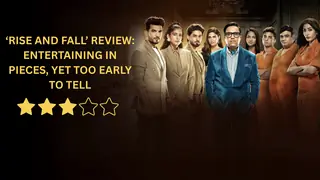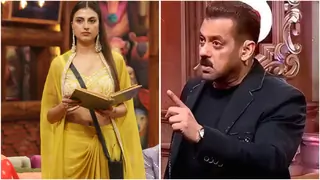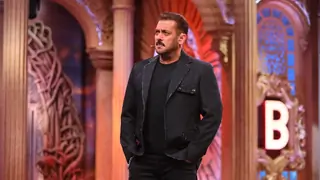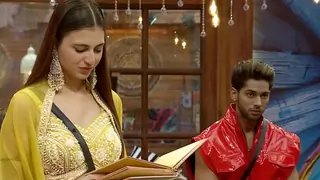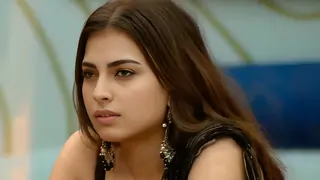 |
King of Melody
|
|
I'm surprised to see a legend of our times living here in this one-room flat in a suburb in splendid isolation. Do you shun the limelight or does the limelight shun you now?
|
|
First, let me tell you I am very happy here. I have enjoyed life to the lees. I got more of the limelight than anybody could aspire for. People crowded around me, producers queued up outside my home. I ate and drank to my heart's content. I had some of the most beautiful and vivacious women in this country for company.
|
|
Always conscious of money, I never undersold myself, refusing to compose even for top banners if the price wasn't right.I drove the best cars, wore the most fashionable clothes of my time. I still have a big flat in Churchgate, but as a result of a family dispute I opted out. So, living in virtual anonymity here in Thane is my own choice. I don't interfere with others' lives and I like to be left alone...
|
|
But isn't it frightfully lonely here?
|
|
You might think so, I don't. I have a set routine. Every afternoon I have two bottles of chilled beer with boiled eggs. Then I rest for a while. In the evening I watch a video or maybe some TV. I have only one meal a day and that's dinner. Till recently I used to practise homeopathy.
|
|
You see those shelves full of homeopathy vials? Those were for local people who used to come in large numbers. But then I got fed up with people calling on me and stopped seeing patients. Every year, I spend a month in the summer at a hotel in Juhu. I don't have too many friends, but the ones I have are very considerate. They insist on giving me a change of scenario and take me there. That's been the pattern for some years now.
|
|
You drink, I see a packet of State Express 555 cigarettes next to the homeopathic medicine bottles, and yet keep yourself fit. What's your secret?
|
|
I am content. I used to smoke a lot, but nowadays I have just two - one in the morning after bed-tea and the other after dinner. I have also stopped drinking whisky. I used to love it. Let me tell you, having tasted the best, I think Black Label is the finest of the lot, even better than Royal Salute. Although I don't practise any more, I still study homeopathy and take some pills. My medicine, like my music, is purely self-taught.
|
|
Self-taught? Surely you must have trained to be a musician and a music director...
|
|
People don't believe me when I say this but the fact is I don't know the ABCD of music! It was all a gift from God that I composed so effortlessly and people liked the music I made. I didn't set out to be a music director, just drifted into it.
|
|
But you started your career as a singer, didn't you?
|
|
Yes, but I never thought of it as a career. People told me I had a good voice because I used to sing at local functions in the city of my birth, Lahore. I was born in 1926 and when I was a teenager, All India Radio set up its Lahore studio. I was invited to sing there on a few occasions. I never liked studies and spent my pocket money, even college fees, buying records. We were paid Rs 30 per programme by AIR and I did about four programmes a month. The money was quite good those days. Besides, I was always headstrong. When my family left for India at the time of Partition, I refused to go.
|
|
We had a Muslim neighbour who sheltered me when the riots began. But one day, a mob arrived at his house and demanded that the Hindu boy he was hiding in the house be handed over. My kind protector organised a tonga and smuggled me out of the back gate. I reached the refugee camp somehow and then made my way to Amritsar in November 1947, a good three months after Partition. Since I had no other skills and was too proud to ask my family for money, I got myself a job as a music teacher in Patiala.
|
|
You taught music although you say you don't know any. How then did you make it as a composer in Mumbai?
|
|
Well, I knew the basics, just about. Anyway, I wasn't interested in teaching music. So I left for Shivpuri, where my sister used to stay, after a few months. I didn't like that place either. There were too many snakes in Shivpuri and I hate reptiles. So, I wound my way back to Amritsar. I had a friend called SN Bhatia of the famous Dewanchand Pharmacy who knew many film industry bigwigs. One day he called me to Delhi because he believed I would make a good composer.
|
|
At Regal cinema in Connaught Place I met the king of the Punjab film industry, Dalsukhram Pancholi. He offered me Rs 500 to score the music for his next film. I said that was too little. Eventually we settled on Rs 600. I went to Mumbai and stayed at Rex Hotel in Colaba (which had no rooms, only cabins) for a few months and composed music for Pancholi's Aasmaan, directed by PL Santoshi, Raj Kumar Santoshi's father. Then I did another film, Chham, chhama, chham, the music from which was quite a hit.
|
|
How did your big breaks start coming?
|
|
After Chham, chhama, chham, Guru Dutt came to my hotel and asked me to be music director of his under-production Baazi. He offered me Rs 12,000 which was a very big amount those days. I was so thrilled I promptly went out and bought two bottles of the finest champagne money could buy. As you know, the Baazi songs, especially those sung by Geeta Dutt, became massive hits. But I fought with Guru Dutt immediately afterwards. He did not give me the full amount. He owed me Rs 3,000 in spite of the film making money.
|
|
I would not give up although he insisted he was broke. So, I approached KK Kapoor, the film's distributor. We drove to Guru Dutt's house in his sleek convertible. Kapoor kept me waiting in the car and went upstairs for what seemed an eternity. Then he came back with Guru Dutt. He had agreed to pay off the rest at Rs 1,000 a month. But there was a rider. I would have to compose for his next film too! That's how I became music director for Aar Paar, another superhit.
|
|
You were engaged by the biggest banners of the time like Subodh Mukerji, BR Chopra, Shakti Samanta. You composed for classics like Ek Musafir Ek Hasina, Naya Daur, Kashmir ki Kali. But later you lost these banners one by one. Why?
|
|
I told you I was always a very headstrong person. When I was hired by S Mukerji Productions for Ek Musafir Ek Hasina, I told them my terms included not just the money; I also wanted a guarantee that there would be no interference. I said this because the film's director, Raj Khosla, who was a big name, fancied himself as a composer and tried to impose his tunes on the music director. Raj Khosla put up his hands, gesturing surrender.
|
|
But one day, just before the recording, he came up with his own composition. I walked out, telling Mukerji that he should hire Khosla as the music director. That evening, Mukerji came over to my house with a bottle of Black Label to sort matters out. Nobody interfered after that. There is no problem if people want to compose. For example, lyricist Pradeep always did so. But I would never tolerate somebody passing off his tunes as mine.
|
|
I had problems with BR Chopra too. He hired me for Naya Daur, but because of our common Punjab background, I knew he nursed grievances against me. I was never happy with him and did not work with his banner despite the big success of Naya Daur.
|
|
Now to the big question: Why did you never use Lata Mangeshkar? It could not have been only on account of Asha Bhonsle, could it?
|
|
I am the only successful music director to have never had a song sung by Lata. People always wonder why. It began ages back, when my mentor, Pancholi, advised me to take Geeta Roy (even before she married Guru Dutt) instead of Lata. I listened to his advice, all the more because I thought Geeta's voice had real character, she was original.
|
|
After I recorded Elo main haari piya with Geeta for Baazi, the biggest film critic of that period, Raju Bharatan, told me, "OP you will rise very high in life." Geeta and I made a good team. Later, I came to the conclusion that Asha was a better singer.
|
|
I can't believe the reason for never using Lata was that simple. Aren't you hiding something?
|
|
I needed inspiration to compose. As I told you, I am not a trained musician. My musical inspiration always came from women. I got that from the women singers I engaged. They were attracted to me too. You must remember I was a very handsome man in my youth, tall, fair with typical Punjabi good looks. I remember Geeta Roy's father once asked me if I used rouge on my cheeks. I was taken aback by the question. He said Geeta thought so because my cheeks were so red!
|
|
Are you suggesting you only took on women singers who sparked something in you romantically?
|
|
Yes, something like that. I enjoyed the competition they had trying to please me. I can tell you today, of the lot, Shamshad Begum had the best voice. It was what you could truly call khanakti aawaz. She was right in believing I downplayed her in order to promote Asha.
|
|
Even towards the later part of your career, you gave the choice lines to Asha in the duet with Shamshad, Kajra Mohabbatwala from Kismat. Was it conscious?
|
|
I must admit it was. I have always been driven by women in my compositions. Believe me, women are a man's greatest inspiration and also the greatest weakness. Coming back to the Lata-Asha issue, I must tell you Asha was a very possessive woman. She also had certain vocal abilities that Lata or even Shamshad never had. I gave my best composing for Asha and she gave her all singing for me.
|
|
Which is your personal favourite among all the songs Asha and you made together?
|
|
I can't say, there are so many of them...
|
|
I know, but try and select a few...
|
|
Actually it is Chayen se humko kabhi from Pran Jaye.
|
|
I am happy to hear that. It's my favourite Asha-OP number too. But she never accepted the award for it. Why?
|
|
She got the Filmfare for the best female singer that year. But by the time it was announced, our relationship had collapsed. She was very bitter about the whole thing. So she refused to turn up to receive the honour...
|
|
Nayyar Saab, you had problems with male singers too. Even Mohammad Rafi, who was known to be hassle-free, stopped singing for you and you had to take on Mahendra Kapoor in the later years. Why did you have such fights?
|
|
That is not totally correct. Rafi was a thorough gentleman, a mild-mannered person and very professional. I had no serious problems with him. We had a tiff once because I insisted on punctuality. He came two hours late for a recording.
|
|
He was very apologetic saying he got delayed by repeated re-takes at a Shankar-Jaikishan recording. But I was furious by then. I had waited just to make a point. So, as soon as he entered the recording studio, I called pack-up after putting in a bill of Rs 12,000 as my fees for the day. He was very upset with me. But then, I was not in the habit of waiting for anybody; even if Asha came in 10 minutes late I used to pull her up in front of everybody. But Rafi and I sorted things out later. He sang for me again in Ek baar muskura do. Rafi, I tell you, was a saintly man, I liked him very much.
|
|
Do you listen to today's film music? Who do you like among the current crop of female singers?
|
|
Honestly, I now find it funny that there are songs at all in our films! When I look back, I think it was all rather amusing and I sometimes can't believe we composed so seriously for contrived song sequences. Sometimes I do listen to new songs. But I find today's music and lyrics have no dum, they are all very artificial. We had such fine lyricists back in those days.
|
|
Of course, I was choosy too, never worked with some of the star lyricists of my time. My preference was for Shakeel Badayuni, Rajinder Krishan and, above all, Shamsul Huda (SH) Bihari. Of the new crop of singers, Alka (Yagnik) and Kavita (Krishnamurthy) are talented. They also come from good, educated backgrounds, not like singers in our time.
|
|
You held your ground against Shankar-Jaikishan, the most popular music director duo of the times with the biggest banners in their pocket. What was the competition like?
|
|
There was no competition, I never believed in that. But once I met Shankar at a druggists' store. He stopped me to say, "Hum ghabratey hain toh sirf tujhse." I told him, "I respect you Sir, you are my senior." That was it. There is never any creative competition in this industry; only money talks. So, there are no friends, no enemies, only interests.
|
|
But it must be flattering that just a few years ago Tushar Bhatia composed songs for Andaz Apna Apna that were clones of OP Nayyar's music. Did he meet you to seek out inspiration?
|
|
No, I never met him. As I told you, I don't like meeting people these days. But yes, I heard the songs; they were good. People used to talk about the Nayyar gharana in Hindi film music.
|
|
Since you were quite a ladies' man in your youth, you must have had some favourites among the actresses. Who were they?
|
|
Madhubala, of course. Although I must tell you that Shama, who never made a big name for herself, was better than Madhubala. But Madhubala was such a fan of mine she told producers she would charge Rs 15,000 less for a film which had music composed by me. We worked together in many movies - Howrah Bridge, Jaali Note, Mr and Mrs 55, Phagun, Do Ustad.
|
|
I had a rehearsal room on the third floor of Famous Studios in Mahalaxmi. At lunchtime, she would sneak up to meet me and we often shared lunch. She respected me a lot. Madhubala was not only stunningly beautiful but also a very sensitive, warm person. No wonder Kishore Kumar was besotted with her, so much so that he converted, became Khalid Khan, just to marry her.
|
|
How did you stumble across the idea of using the hoof beat of horses as your standard taal? Was it original?
|
|
Basically, it is the beat of Punjab. People don't remember any more, but the melodies composed by our early greats - music directors like Ghulam Haider, RC Boral and Pankaj Mullick - were also very earthy and rhythmic. If you have heard Pankaj Mullick's Chale pawan ki chaal, you will recall that song too had hoof beats as the background music. I used to like that song a lot. In that sense, my horse trot was not entirely original. But I composed songs with that beat, people liked it and it became my trademark.
|
|
Finally, let me ask you once again, are you sure you have no regrets living in this manner, far away from everybody and everything?
|
|
You have stirred many memories in me. I have been so happy talking to you about the old times. Nobody cares for people like us any more, not that I want people around me. Because you have brought some cheer to me today, let me be very honest and tell you that my only regret is that I have no regrets. Believe me, I am very happy. But at times, I do keep remembering a sher that I want you too to hear:
|
|
Aashiyan apna loota apni nazar ke saamne,
|
|
Ho ke beghar main khada apne ghar ke saamne.
|
|
(My beautiful world crashed before my very eyes/ I stand homeless outside my own home)
|
|
| Make whatever you will of this! |













